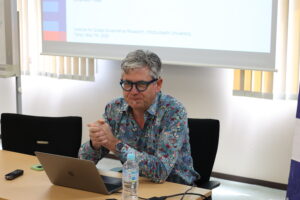On May 7, 2025, Hitotsubashi University’s Institute for Global Governance Research (GGR) hosted its 38th Brown Bag Lunch Seminar titled “Figurations of Digital Futures – or: Why We Need Media and Communication Research on Emergence” featuring Andreas Hepp, Professor, Media and Communications, Head of ZeMKI, University of Bremen, Germany.
Professor Andreas Hepp began his talk by emphasizing that in today’s era of rapid technological change, digital futures, visions of society shaped by digital media, play a major role in shaping politics, business, and culture. These are not just fantasies, they influence real agendas. However, the concept of “imaginaries” is often used vaguely and without solid theoretical grounding. Hepp argues that media and communication research must focus on how digital futures are imagined, practiced, and accepted as normal. He identifies two key gaps. First, imaginaries must be understood through social theory, ideology, practice, and history. Second, the term “digital futures” is often used without clear definition. To address this, Hepp examines why these futures matter, the role of early adopters, and the rise of Communicative Artificial Intelligence (ComAI) in journalism.
Professor Hepp focuses on pioneer communities, early users and thinkers who shape new technologies and stories. These groups move through stages: forming, experimenting, gaining support, and spreading ideas. A past example is The Whole Earth Catalog, which influenced early tech thinkers. Today, open source AI groups and environmental tech networks serve similar roles. These communities do not just use technology, they imagine how it can change society. Their ideas grow through blogs, forums, funding, and eventual mainstream acceptance. ComAI in journalism is a key example. In the early 2010s, AI tools were experimental. By 2019 they had gained support, and by 2024 they had become central in newsrooms, changing how journalism is done.
In the Q&A, questions raised about whether AI would improve or reduce journalistic creativity. Hepp replied that the question assumes a fixed future. Before judging AI’s role, we must ask what kind of future we want as a society. Only then can we decide how technology should be used.
Professor Hepp concludes that studying emergence is vital. Scholars must explore how digital futures are imagined, who drives these visions, and what power structures they sustain. Without this lens, we risk accepting digital futures as inevitable, rather than critically understanding their construction.
[Event report prepared by] Billal Hossain (Doctoral student, Graduate School of Law, Hitotsubashi University)

